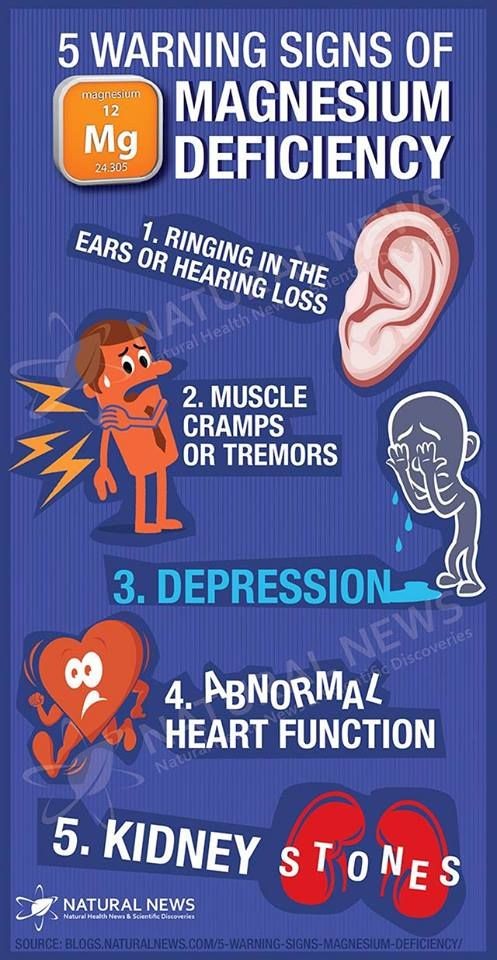
Contents
- 1 Signs of Magnesium Deficiency
- 1.0.1 What is Magnesium Deficiency?
- 1.0.2 Causes of Magnesium Deficiency
- 1.0.3 Recommended Daily Magnesium Intake
- 1.0.4 Treating Magnesium Deficiency
- 1.0.5 Consequences of Magnesium Deficiency
- 1.0.6 Benefits of Magnesium Supplements
- 1.0.7 Who Should Avoid Magnesium Supplements?
- 1.0.8 Can Magnesium Supplements Cause Side Effects?
- 1.0.9 Subscribe to MedicineNet’s Weight Loss/Healthy Living Newsletter
Signs of Magnesium Deficiency
Magnesium deficiency often goes unnoticed until levels become dangerously low. Here are 4 signs to watch for.
The four signs of magnesium deficiency are:
- Muscle twitches and cramps: Tremors, twitches, and cramps are indications of magnesium deficiency. Severe cases can even cause seizures or convulsions. These symptoms result from an excess flow of calcium into nerve cells, which hyperstimulates nerve endings.
- Irritability and mood swings: People with magnesium deficiency often experience symptoms like irritability, aloofness, mental numbness, or absence of emotions. Severe deficiency can lead to delirium and coma. Some studies have also reported a link between low magnesium levels and increased risk of depression and chronic fatigue.
- Osteoporosis: Magnesium deficiency is a risk factor for osteoporosis, a condition that weakens bones and increases the risk of fractures. In addition to directly weakening bones, magnesium deficiency lowers blood levels of calcium.
- Irregular heartbeat: Heart arrhythmia (irregular heartbeat) is one of the most severe symptoms of magnesium deficiency. Severe cases can be detected on an electrocardiogram.
What is Magnesium Deficiency?
Magnesium deficiency, also known as hypomagnesemia, is often overlooked. In many cases, it remains undiagnosed until magnesium levels become severely low.
Your body requires magnesium for vital bodily processes, such as muscle and nerve function, glucose regulation, blood pressure control, and the synthesis of protein, bone, and DNA.
Medical conditions associated with chronic magnesium deficiency include diabetes, poor absorption, chronic diarrhea, renal failure, overuse of antacids, celiac disease, and hungry bone syndrome.
Causes of Magnesium Deficiency
Causes of magnesium deficiency vary, from insufficient dietary intake to excessive loss of magnesium from the body.
Common reasons for low magnesium levels include:
- Excessive alcohol consumption
- Burns affecting a large area of the body
- Chronic diarrhea
- Excessive urination
- Hyperaldosteronism (excessive aldosterone release from the adrenal gland)
- Kidney tubule disorders
- Malabsorption disorders like celiac disease and inflammatory bowel disease
- Malnutrition
- Pancreatitis (inflammation of the pancreas)
- Excessive sweating
Recommended Daily Magnesium Intake
The amount of magnesium needed depends on age and sex.
Daily suggested doses in milligrams:
- 0-6 months: 30 mg
- 7-12 months: 75 mg
- 1-3 years: 80 mg
- 4-8 years: 130 mg
- 9-13 years: 240 mg
- 14-18 years (boys): 410 mg
- 14-18 years (girls): 360 mg
- Over 18 years (men): 400-420 mg
- Over 18 years (women): 310-320 mg
QUESTION
Treating Magnesium Deficiency
You can obtain enough magnesium through your diet.
High magnesium foods include:
- Nuts, especially almonds, cashews, and peanuts
- Spinach
- Black beans
- Peanut butter
- Whole wheat bread
Other food sources of magnesium include:
- Oatmeal
- Kidney beans
- Bananas
- Apples
- Fish like salmon and halibut
- Milk
Specific nutrients and conditions can influence the rate at which your body absorbs magnesium.
To increase magnesium levels, consider:
- Avoiding high-dose zinc supplements
- Treating vitamin D deficiency
- Eating raw vegetables
- Quitting smoking
Doctors may prescribe magnesium supplements for people with poor magnesium absorption or underlying medical conditions that hinder magnesium absorption.
Consequences of Magnesium Deficiency
Persistent low magnesium levels can lead to symptoms such as:
- Muscle cramps
- Fatigue
- Irritability
- Depression
Long-term magnesium deficiency may increase the risk of:
- High blood pressure
- Heart disease
- Type II diabetes
- Migraines
Benefits of Magnesium Supplements
Magnesium is crucial for strong bones, nerve and muscle function, and energy production. Foods high in fiber like leafy vegetables, nuts, seeds, beans, and whole grains are good sources of magnesium.
However, most Americans do not get enough magnesium in their regular diets, even though a few servings of magnesium-rich foods can meet most of their daily requirements.
Magnesium supplements can be helpful for conditions that cause faster magnesium loss than can be replenished through diet, including:
- Health issues:
- Alcoholism
- Severe diarrhea
- Severe vomiting
- Stomach/intestinal absorption problems
- Poorly controlled diabetes
- Magnesium supplements may also assist with:
- Hypertension (prevents blood vessel contraction, improving blood flow and lowering blood pressure)
- Preeclampsia (pregnancy complication causing high blood pressure, swelling of the feet, and sometimes seizures)
- Migraines
Magnesium can also be used as an antacid, laxative, preventive measure against birth defects, and sleep aid:
- Antacid: Oral magnesium supplements neutralize stomach acids, reducing symptoms like heartburn and indigestion.
- Laxative: Magnesium acts as a laxative, treating constipation and clearing the bowels before medical procedures.
- Birth defect prevention: Some studies suggest that intravenous magnesium given to pregnant women under supervision may reduce the risk of birth defects like cerebral palsy.
- Sleep aid: Studies show that magnesium supplements taken at night can help relax muscles and improve sleep quality.
Since magnesium supplements require stomach acid for absorption, it’s best to take them after a meal.
Who Should Avoid Magnesium Supplements?
Magnesium supplements are not recommended for everyone. Always consult your doctor before starting any supplements.
Your doctor will likely advise against magnesium supplements if you have the following conditions:
- Myasthenia gravis
- Heart block
- Kidney failure
Can Magnesium Supplements Cause Side Effects?
Ingesting too much magnesium from natural foods is typically safe, and taking magnesium supplements in doses less than 350 milligrams daily is safe for most adults.
Excess magnesium can accumulate in the body and cause side effects, including:
- Nausea
- Vomiting
- Abdominal cramps
- Loose stools
- Low blood pressure
- Confusion
- Slow breathing
- Coma
Extremely high magnesium levels can be life-threatening.
Subscribe to MedicineNet’s Weight Loss/Healthy Living Newsletter
By clicking "Submit," I agree to the MedicineNet Terms and Conditions and Privacy Policy. I also agree to receive emails from MedicineNet and understand that I may opt out of MedicineNet subscriptions at any time.
By clicking "Submit," I agree to the MedicineNet Terms and Conditions and Privacy Policy. I also agree to receive emails from MedicineNet and understand that I may opt out of MedicineNet subscriptions at any time.


